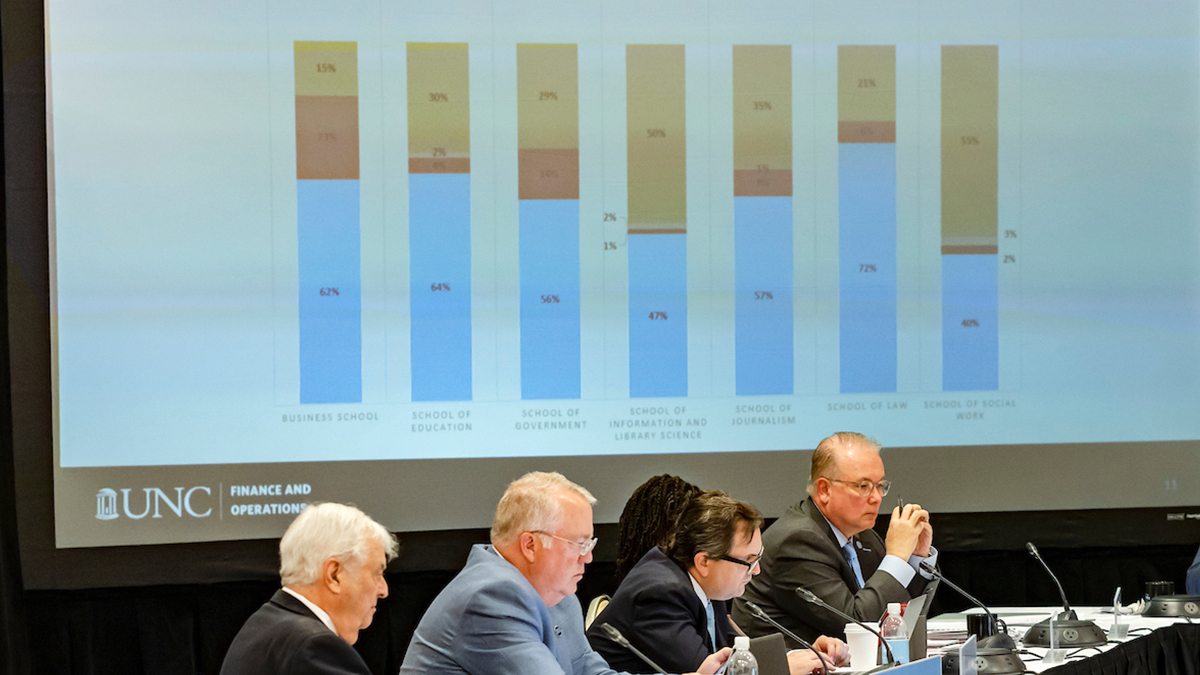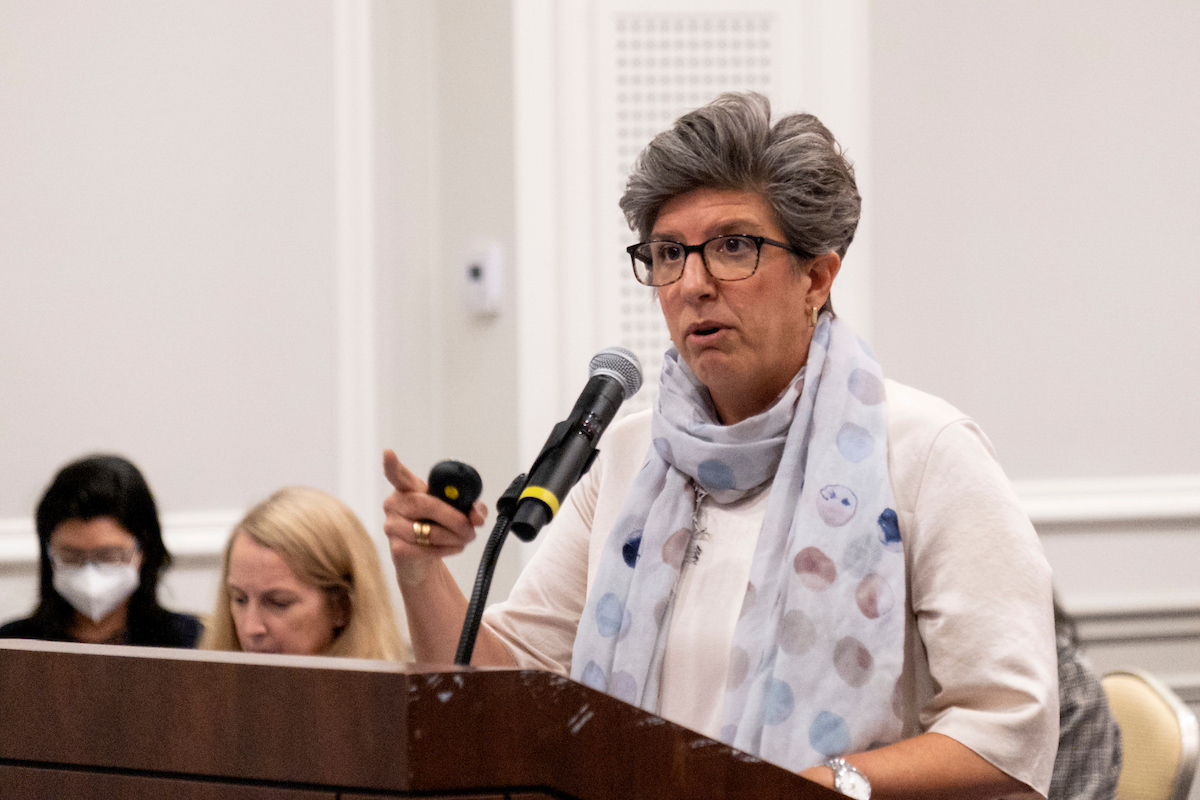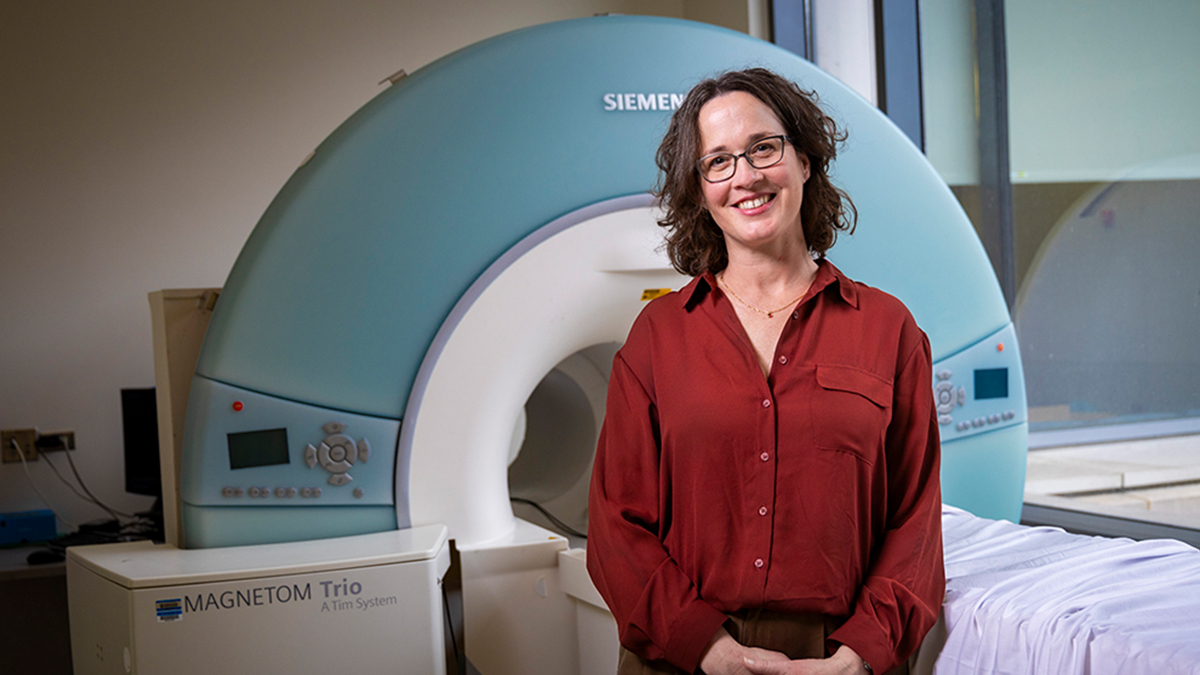Balanced budget, brain research highlighted at trustees March meeting
University Board of Trustees members applauded the new all-funds budget model and a new center to research the impact of technology on teen brains.

The University achieved a major milestone March 24 when the Board of Trustees approved its first balanced budget projection for the 2022-23 fiscal year. Revenue and expenses balanced out at about $4 billion.
“This is an example of delegated authority at the highest level,” said board Chair David L. Boliek Jr. when the full board approved the budget as part of its consent agenda at the March 24 meeting. He asked for a round of applause for Nathan Knuffman, vice chancellor for finance and operations.
Knuffman presented a detailed description of the all-funds budget model the previous day to the Budget, Finance and Infrastructure committee.
“It has involved much more transparency. It has involved establishing a balanced budget for the first time in about nine years,” said Chancellor Kevin M. Guskiewicz in introducing the report. “I’m proud of the fact that we’ve worked as a team to get to this point. We actually have a modest revenue base that we can reinvest in our people and in the mission of this University.
The budget is the result of a process change that began about 2½ years ago, when the University faced new budgetary requirements from the UNC System and a $100 million shortfall. Then the pandemic hit.
“We were operating from an annual financial report. That was the only financial tool we had, and it was backward-looking,” Knuffman reminded the committee. “We established a template, built some trust on campus and used it to weather a pandemic and address a fiscal challenge.”
Brain research and Collaboratory
Leaders of center that was only a day old and a program that recently celebrated its fifth anniversary gave presentations to the full board.
Established last week with a $10 million gift from the Winston Family Foundation, the Winston National Center on Technology Use, Brain and Psychological Development will create more tools for parents, caregivers and teens to make better informed choices about how they interact with technology and social media.
James Winston Jr., director of the Winston Family Foundation and a psychologist with experience in treating addiction, also has a personal connection to the project. “I’ve tried to set up a firewall. I tell my 13-year-old, who has a flip phone, by the way, ‘I care about your brain not your image,’” Winston told the trustees.
Jeff Warren, executive director of the NC Collaboratory, brought the trustees up to date on the unique program created by the state legislature five years ago and based at Carolina. The Collaboratory has or will soon fund more than 300 projects across all 17 campuses in the UNC System. It has received more than $145 million in legislative appropriations.
Warren will be team-teaching a class called Science in Hyper-partisan Times, and the Baity Lab in the Gillings School of Global Public Health will be renovated with Collaboratory funds for a project that seeks to remove PFAS compounds (like GenX) from potable water sources.
While much of Carolina’s research funding comes from the federal level, Warren pointed out that state research funding also has its advantages. “It’s much easier to change state-level policy, especially when the research is being done here.”

The Great Resignation has impacted the University, with especially high voluntary departure rates by Black, Asian and Latinx women in 2021, reported Becci Menghini, vice chancellor for human resources and equal opportunity and compliance. (Jon Gardiner/UNC-Chapel Hill)
Great Resignation, cybersecurity
Other key presentations over the two-day trustee meeting schedule included a report on resignations and retirements to the University Affairs committee and a cybersecurity update given to the Audit, Compliance and Risk Management committee.
The Great Resignation has impacted the University, with especially high voluntary departure rates by Black, Asian and Latinx women in 2021, reported Becci Menghini, vice chancellor for human resources and equal opportunity and compliance.
- In 2017-20, voluntary turnover rates at Carolina averaged about 7%. In 2021, the voluntary turnover rate was 10.29%
- The number of voluntary employee departures in 2021 was 1,341 in 2021, 480 more than in 2020.
- 196 Black or African American women left the University in 2021, almost twice the number who left in 2020.
- 80 Asian women left the University in 2021, up from 56 in 2020.
- 74 Hispanic or Latinx women left the University in 2021, twice the number who left in 2020.
Human Resources is addressing concerns cited in exit interviews with the Future of Work program to promote a flexible work environment and support of personnel rule changes being considered by the Board of Governors. The office is also intervening directly in the hardest-hit units (housekeeping, facilities, UNC Police, Student Affairs, Lineberger Comprehensive Cancer Center).
On the cybersecurity front, layered defenses and multifactor authentication have helped ITS cut the number of compromised accounts from hundreds per month in 2017-18 to only 12 compromised accounts since December 2018, reported J. Michael Barker, vice chancellor for information technology and chief information officer.
In other action, the Board of Trustees:
- Passed a resolution honoring departing trustee and outgoing Student Body President Lamar Richards.
- Approved a lease for 24,500 square feet of office space for the UNC Innovation Hub, innovation and entrepreneurship programming, and co-working space, in the old NCNB/Bank of America Plaza at 136 E. Rosemary St.
- Heard a plan from University Career Services and the General Alumni Association to work collaboratively to connect graduating students seeking jobs with professional alumni using the PeopleGrove platform.
- As a follow-up to recent delegation of authority decisions, created a personnel committee to make appointments of all Tier II senior academic and administrative officers and athletics assistant coaches with starting salaries exceeding $250,000.
- Approved in-state tuition qualification for all undergraduate student athletes receiving full athletic scholarships, a change recently authorized by the state legislature.
- Extended COVID-19-tenure clock relief for another 12 months, allowing tenure-track faculty members to apply for a single COVID-19-related extension between May 2022 and May 2023.




